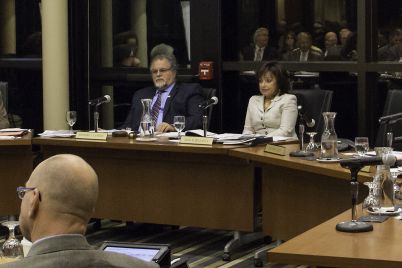
A panel of professional writers came to speak at the Creative Careers in Writing event. From left: Steven Bennighoff, Jason Marker, Adrienne Haywood, Jelani McGadney, and Matt Durr. Andrei Pop | Washtenaw Voice
BY JENELLE FRANKLIN
Staff Writer
The sixth annual “Cool Careers in Writing” panel discussion was held in Washtenaw Community College’s Writing Center Thursday, March 24.
Five panelists from five different writing careers spoke about their daily job assignments, their education and the paths that eventually led each of them to where they are now.
The event was hosted by three Washtenaw Community College faculty members: Hava Levitt-Phillips, Lisa Veasey, and Dave Waskins.
The few dozen attendees heard how students who graduate from WCC like Matt Durr, MLive’s business reporter, can take their degrees into the workforce and find success.
Durr, who completed his journalism major at WCC, said his favorite part of his job is that, “You wake up and there’s something new waiting for you each day.”
Durr said his experience being a multi-platform writer, able to write for print or digital news in combination with knowledge of Indesign software, can help to get a foot in the door when entering the workforce. The journalist’s career requires being to able to write and article anywhere, being flexible and able to get the work done as soon as the news hits.
“I’ve sat on the sidewalk in Depot Town and typed up a story right there after an event,” Durr said.
“Always keep a portfolio of clips of published work,” Durr urges, “because you need them to show to prospective employers.” His collection starts with his articles from WCC’s own student newspaper, The Washtenaw Voice. What is needed is to get the ideas out there, and “The Voice gives you a platform,” Durr said.

Numerous individuals attended the Creative Careers in Writing panel at the Writing Center. Andrei Pop | Washtenaw Voice
Although Durr focused on journalism, other panelists like Adrienne Haywood sought multiple areas of study and then settled in technical writing.
Haywood, senior technical writer for Thomson-Reuters in Dexter, has had a winding path that started with anthropology, the study of human culture, as her area of study.
“It has been especially helpful for me as a technical writer,” Haywood said.
She finished her double major at Eastern Michigan University in anthropology and English and has enjoyed the career she chose in writing.
“I am an introvert at heart and my job extroverts me with the people I communicate with everyday. It has been good for me all the way around,” Haywood said. “Along the way, you should network, network, network.”
Her diverse skill set has taught her the importance of enjoying the ride to success as much as the success itself.
Attendees like Olivia Johnson, WCC journalism major from Brighton, had an opportunity to network with panelist Haywood after hearing her story and how she got to the place she loves being.
“She has a similar background to mine, so it was inspiring to hear how she has gotten this far in life. She spoke about anthropology and that was one of the first things I ever wanted to do,” Johnson said. Johnson mentioned transferring to EMU for her bachelor’s degree.
While Haywood received her English education from EMU, and Johnson looks to do the same, fellow panelist Steven Benninghoff, who is an associate professor at EMU, didn’t get into his writing career until attending Purdue university for his PhD.
“Winding paths are the best thing. As a human being, you embody multiple fields and the connections across them,” Benninghoff said. “Formal education gives you the terms necessary to talk at that strategic level about these things (you’ve learned).”
Benninghoff is an advocate for the articulation agreement, which allows credits to be matched from WCC to EMU in many departments.
Returning panelist Jelani McGadney, works as a writer for politicians writing speeches, letters, press releases, bills, and amendments.
“You are never writing for yourself in politics. It’s not only knowing the topic and whatever form you have to write that topic in, but also you have to know your boss, their politics and their voice,” McGadney said.
The legislature works Tuesday, Wednesday, Thursday each week, but that doesn’t leave McGadney with long weekends, as he said he spends his days not at work planning for the work week.
A comprehensive knowledge of writing has proved necessary to get panelist Jason Marker through a widespread writing career and exactly where he wants to be- at home.
Marker, freelance game designer and writer from Detroit, says he uses a combination of creative and technical writing in his career. His other skills are managing the home during not writing hours.
Marker spends most days working from home, an opportunity he has gotten after years of “hard work and hustling,” he said.
Marker writes ad copy for spaceship companies, books for games like “The Thin Blue Line,” and is an automotive blog writer alongside his editor.
Advice from Marker: “Always work hard, and never work for free.”
“Every year new folks join our panel, and others return from year to year. We always want to feature writers in a variety of fields, to showcase how much opportunity there really is out there for folks who want to write,” Levitt-Phillips said about what to expect for next year’s seventh-annual panel.

